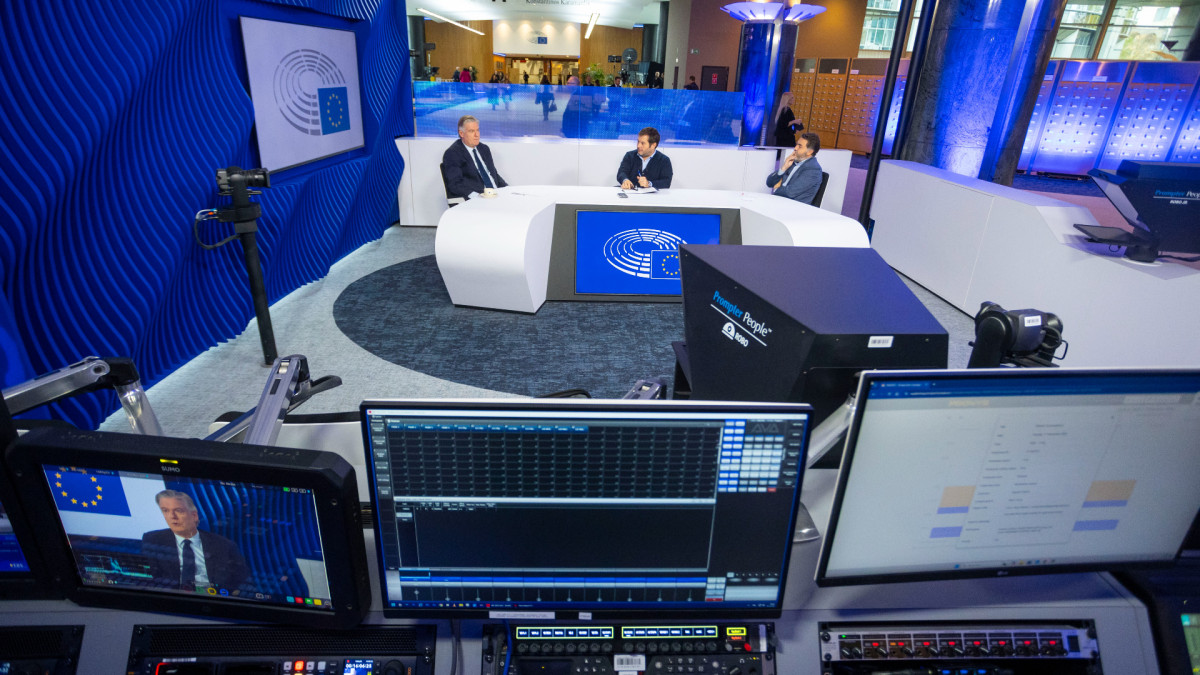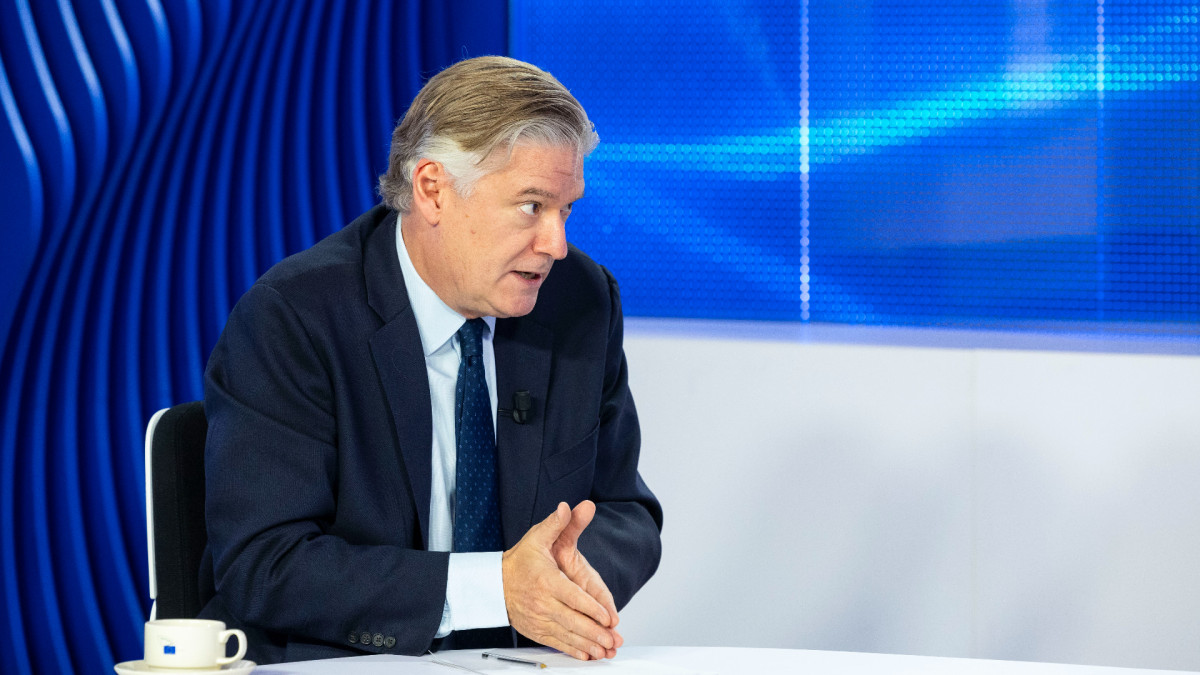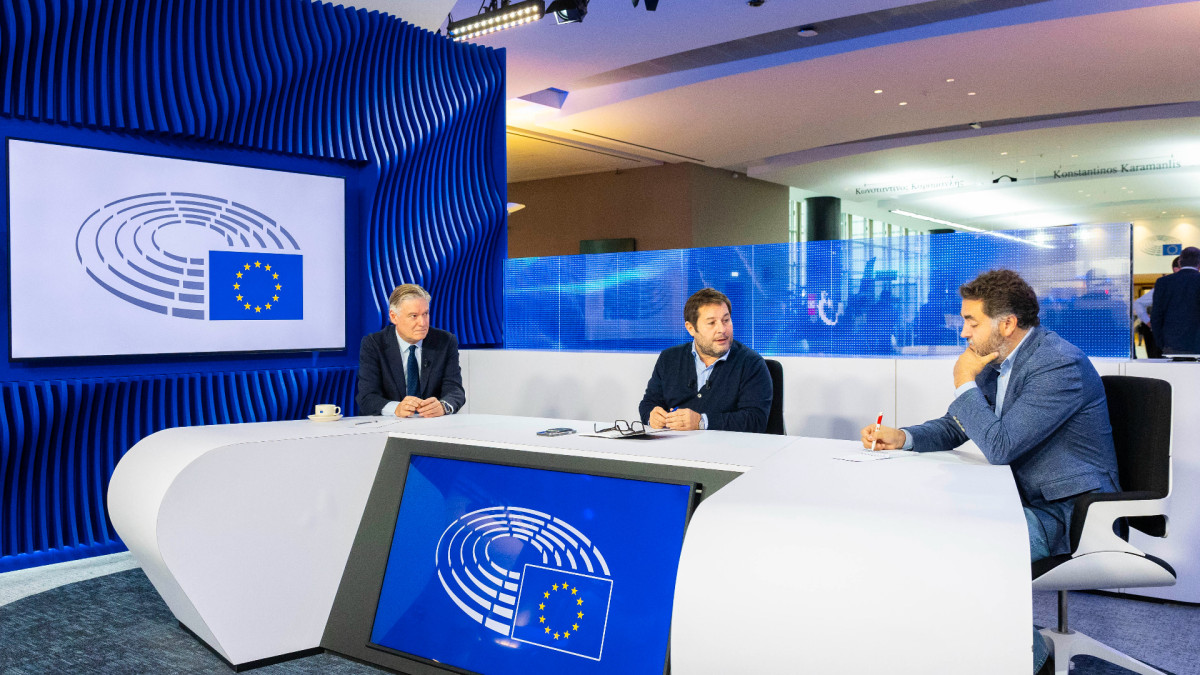The European Parliament again opened its doors to Agenda Pública, prompting me to travel to Brussels to speak with Antonio López-Istúriz of the European People’s Party (EPP) and Jonás Fernández of the Progressive Alliance of Socialists and Democrats (S&D). Under the auspices of Agenda Pública EU, these MEPs and I had a very interesting conversation about Ursula von der Leyen’s Commission, the current role of the European Parliament, and the political balance dominating that legislative body.
In assessing the current Commission, I found very sincere a reflection by Antonio López-Istúriz: “Von der Leyen and the Commission are now faced with a Parliament where extremes are growing.” For his part, Jonás Fernández voiced his disappointment with how the Commission has handled the issue of the European budget. “It inspires little ambition and underscores my sense of a disappointing year.”
Needless to say, these two MEPS share common ground that is perhaps less observable between their parties in Spain. For example, both Tono and Jonás lamented the influence of radical parties in Parliament, and both admitted to certain concerns about Donald Trump – with nuanced language, of course. What follows is this engaging conversation with two great parliamentarians.

‘Agenda Pública’ se desplaza hasta el corazón de Bruselas. Photo: Agenda Pública / BR&U
I’d like to ask you to offer an initial political assessment of this past year, specifically since the start of the second Commission under Ursula von der Leyen.
Jonás Fernández (J.F.): This legislature began with a very ambitious promise linked to the Draghi and Letta reports, which in some way laid out a clear government agenda – the need to reinitiate European productivity and to put the Single Market at the center of that promise. In those reports, almost all pro-European political groups found something with which to identify – albeit with different accents on the need to move this agenda forward to revive growth, improve integration, and strengthen social policies.
However, although both reports identified areas where the European Union should accelerate integration – economic and defense integration, industrial policy, and others – we’ve seen very little progress and, in some cases, clear setbacks linked to an agenda of deregulation that’s unlikely to have much impact on improving the competitiveness of the European economy.
Antonio López-Istúriz (A.L.I.): Von der Leyen and the Commission are faced with a Parliament where the extremes are growing, and that influences the debate.
“Now we want to catch up, pay for our defense, and build our own defense industry within a few years. But this takes time”António López-Istúriz – MEP for European People’s Party Partido Popular Europeo
Jonás mentioned that the advances in defense have been disappointing. We should recall that, in the previous legislature, a ‘defense commission’ as such didn’t even exist. Talking about defense was, shall we say, ‘unfashionable’. Now we want to catch up, pay for our defense, and build our own defense industry within a few years. But this takes time. The strategic plans set out by the Commission are beginning to be implemented. It has taken five years to change from a prior model based on climate policies to something called ‘competitiveness’.
Without renouncing our previous objectives, we need to adapt our industry and create jobs.
Seen from Spain, the PSOE and PP each form a central part of their respective European parliamentary groups. What can these two major Spanish parties do to ensure that, despite the growth of extremism, a majority such as the one we’ve had can continue at the European level?
J.F.: I’d like to comment on competitiveness, which this mandate has made a key objective. Probably, the need to accelerate the growth of the European Union isn’t fully perceived in Spain, because our economic data are positive. But Germany, France, and Italy are showing that Europe needs to grow more.
For that to happen, we need to identify the bottlenecks that impede growth. Community-wide legislation is seen as an obstacle. We’ve received and will continue to receive omnibus proposals from the Commission that seek to rationalize, simplify, and deregulate Community legislation.
In autumn of 2024, the IMF estimated that, within the EU itself, there were implicit tariffs of 40% for goods and 110% for services, due to the fact of not having completed the Single Market. These are so high that I’m surprised they don’t spark general dissatisfaction that then would push the Commission to eliminate them. On the other hand, we’re focused on the political effort to simplify regulations – which is reasonable – but we ignore the real problem: these implicit tariffs represent the administrative costs that slow European growth. That’s why this year has been a disappointment.
A.L.I.: One clarification: Spain’s economic situation isn’t as good as it seems.
J.F.: As for extremists in the European Parliament, they’re an obstacle to integrating markets and to speeding integration. The most conservative right and extreme right members together represent around 26 to 28% of Parliament. Radical groups to our left have a much smaller weight. The problem is that 30% of institutional power is in the hands of non-pro-European forces, which makes it difficult to build majorities that can resolve our fundamental problems.
A.L.I.: The rise of extremes isn’t only to the right but to the left as well. Both are systematically opposed to everything. The strategy isn’t to rope them off and isolate them but to force them to work toward consensus. When they’re forced, they get diluted. That’s a titanic effort that the traditional parties have to make.
The Covid-19 crisis and other circumstances have favored the emergence of parties that promise magical solutions. We must respect the voters, analyze them, and offer attractive policies without falling into extremes.
-1920x1080.jpg)
Jonas Fernandez (S&D) sees extremes in the European Parliament as a problem of majorities. Photo: Agenda Pública / BR&U
Let’s talk about Trump. How his arrival been felt in the areas of economy and defense?
J.F.: The transformation of the defense subcommittee into a committee isn’t primarily due to Trump but to Putin’s invasion of Ukraine. That threat to European security prompted reflection on policies for both defense and industrial defense. But it’s true that Trump went a step further, since his commitment to NATO is shaky, and his statements about Greenland created uncertainty.
We’re seeing increases in defense budgets that, although necessary, won’t improve security if they’re not undertaken jointly. The Europeanization of defense is advancing in terms of debate, but not so much in terms of joint action.
A.L.I.: In international politics, the best thing to do is to put yourself in the other’s place. If we think only as Europeans, we’ll be wrong about the United States. Trump is Anglo-Saxon in his style of negotiation: he comes to the table, asks for a lot, then takes half of what was proposed. You may like it or not, but it’s effective. Europe with Ursula von der Leyen has managed tariffs well in the medium to long term and gained stability.
Trump has also reached historic agreements, such as the recognition of Israel by Arab countries. You have to study his character closely: he’s more effective than he seems.
There are complaints from Parliament that the Commission doesn’t give them sufficient consideration and is tending toward a national rather than a European model. Where are we in that negotiation, and how might it evolve?
J.F.: I see a de-Europeanization of the Community budget. The Commission has given in to pressure from the Member States and handed out national cheques instead of maintaining clear Community-wide criteria. It inspires little ambition and underscores my sense of a disappointing year.
A.L.I.: The seven-year financial framework provides stability, but the Commission has given up a lot to the States. The discussion around who has more power – Brussels or the countries – will always persist.

Antonio López-Istúriz opts for putting himself in the other’s shoes when talking about international politics. Photo: Agenda Pública / BR&U
In this look at the past year, we can’t forget Ukraine. How do you see that situation?
J.F.: Trump promised to fix Ukraine in 72 hours but failed to do so. Europe has to increase its support for Ukraine, and not only for its territorial integrity. The freedom of the European Union is also at stake. The threat of Putin demands that European support be maintained, although do I miss the presence of Borrell in foreign affairs.
I began the conversation by asking for an assessment of the Commission under ‘von der Leyen 2.0’. To conclude, I’ll ask a similar question: Do you think the power and influence of Ursula von der Leyen has diminished?
A.L.I.: The system was destroyed by a procedure called ‘spitzenkandidaten’, a mechanism introduced by the political parties – moderates, Socialists, and the People’s Party. It was an attempt to bring the presidency of the European Commission closer to the citizens, with the aspiration that a direct vote would someday be practiced. This meant that, at the very least, the party that won elections would decide who occupies the presidency of the Commission. Among diplomats, civil servants, and others – those who don’t stand for elections – it was decided that this system had to be ended, because it gave too much independence and prominence to the president of the Commission. That’s partly what happened with Jean-Claude Juncker, and after him they got scared and changed the system. So this isn’t exclusively a question of Ursula von der Leyen.
Antonio, don’t you see this as less ‘visible’, politically speaking?
A.L.I.: No, I see it as very visible. Ask people on the street, everyone knows who they are, for better or worse. The problem is one of effectiveness – powers that have been given to the president, which aren’t the same powers given to Juncker in his day. That was a battle that I’ve always criticized publicly, where the system is so poorly valued by the European population: ‘men in black’, hidden officials making decisions in the corridors of the European Council at six in the morning, with fatigued politicians deciding on that change.
J.F.: Antonio is largely right. Another problem that contributes to a certain disfigurement of the president is the electoral results – at both the European and national levels – where we’ve seen in recent years how forces that don’t believe in the process of European construction represent 20, 25, 30% of the votes.
“Radical parties constitute a wedge significant enough to hinder a more ambitious agenda by the Commission”Jonás Fernández – MEP of the Progressive Coalition of Socialists and Democrats
Therefore, although they’re obviously not a majority, and far from it, they constitute a wedge significant enough to hinder a more ambitious agenda by the Commission. At the same time, they distract us with issues which I believe – as I said at the outset – do nothing to resolve our problems in the economic field. Far from it. A budget proposal of little ambition, and the promotion of a de-Europeanization of policies. I hope that next year I’ll have a different opinion.
A.L.I.: We’re still at the beginning of this legislature. Undoubtedly, the presentation of projects will now commence, and we’ll see which ones get fulfilled. This is Europe, ladies and gentlemen. There are 27 members and the opinions of both Malta and Germany must be respected. It’s a slow, tedious process – which exasperates even the major players – but what we want is security for everyone, 500 million non-identical citizens of Europe. We’re very different in terms of our cultures, our languages, and our politics. In short, we must take all these things into account. If we want the Finns to listen to the Spaniards, we’d better be listening to them, too. Let’s put behind us the sellers of miraculous elixirs and prophets of the Apocalypse, who always appear in times of great anxiety.
We’ll weather the situation. We have to weather it, because on other occasions we’ve ended up in a world war. Let’s hope that, this time, logic and reason and historical memory will prevail and we’ll solve our issues with negotiations, and with the rational desire of European society for effective governments. The system needs to be changed, undoubtedly. After an economic crisis, we all agree that it’s necessary to review the entire political system – European, Spanish, and all countries. But not at the price of creating one-person regimes. That I say to those who would align with China.
Thank you both very much.
.jpg)
Marc López Plana conducted a review of the main items on the European agenda. Photo: Agenda Pública / BR&U
